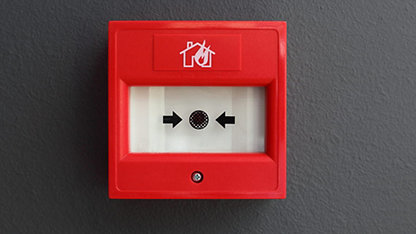NEW WORLD-WIDE FIRE SAFETY STANDARD LAUNCHED
At present, there are many contrasting approaches and requirements across the world in relation to fire safety, which have resulted in significant variations in the design, approval, construction methods, products and operation of buildings. The development of a common understanding of building design, construction and management and how the impact of fire affects these, will help to build trust and confidence among the many and varied actors, including the public and finance industry, ultimately underpinning an improved quality of life and increased investment in line with UN sustainable development goals.
The adoption of the International Fire Safety Standards Common Principles (IFSS-CP) will provide a connected and more consistent approach that will yield considerable benefits and improve our ability to:
- respond to events
- monitor ongoing developments
- anticipate future threats and opportunities and
- learn from past failures and successes
Published date: 08 March 2021
Published date: 23 April 2021
Published date: 27 October 2022
Published date: 28 November 2022
Published date: 06 March 2023
IFSS-CP establishes overarching, performance-based common principles for fire safety engineering design, construction, occupation and ongoing management. IFSS-CP is intended to be flexible and non-prescriptive so that it can be adopted incrementally and advance good practice. The common principles have been developed so that they are universally applicable throughout the world, regardless of the existing codes, standards and guidance already in place. The adoption of IFSS-CP will help protect people, buildings and contents, and the environment from the destructive effects of fire.
The IFSS-CP provides a performance-based framework that applies in all stages of a building’s life cycle (design, construction, in use, change and demolition).
The five IFSS-CP can be defined as follows:
- Prevention – Safeguarding against the outbreak of fire and/or limiting its effects
- Detection and Communication – Investigating and discovering of fire followed by informing occupants and the fire service
- Occupant Protection – Facilitating occupant avoidance of and escape from the effects of fire
- Containment – Limiting of fire and all of its consequences to as small an area as possible
- Extinguishment – Suppressing of fire and protecting of the surrounding environment
The IFSS-CP framework articulates the functions, life span characteristics and attributes of fire safety in buildings. It can be used to determine general and specific functions (building and management), hierarchies, competencies, knowledge and skills. IFSS-CP has been designed for policy makers, professionals and others to ensure that they have considered the full breadth, depth and range of fire safety strategies and measures at each stage of the Building Life Cycle.
The Coalition advocates that the adoption of IFSS-CP will amongst other things:
- protect people in and around Buildings
- provide safe access and egress for firefighters
- allow for harmonisation of Common Principles and good practice
- be accessible to all relevant parties, commensurate with allowing robust comparisons to be made
- complement local and regional standards wherever possible
- accommodate the need for periodic innovation, refinement, updating and changes
- recommend a standard reporting format, where appropriate
- support the development of consistent language and terminology for the worldwide and increasingly mobile professions involved in fire safety
- enable global comparisons and benchmarking and provide a system benchmark for international good practice
- inform the development and review of government policy and
- support education and training in fire safety and fire safe design and construction to increase awareness among the population
A global coalition of over 80 fire safety leadership organisations on 11th October 2022 launched a new Decade of Action for Fire Safety 2022-2032, to ensure an internationally consistent approach to the safety and management of buildings, infrastructure and more with the aim of saving lives by reducing risk and preventing devastating fires.
To find out more, click here.
Despite rapid globalisation, with investment flowing across borders, money pouring into built assets and increasing numbers of different professionals operating across the world, the industry currently lacks a consistent set of high-level principles for design, construction and management of buildings for fire safety.
Public risk
Differences in materials testing and certification, national building regulations or codes and guidance on managing buildings in use, particularly higher-risk premises, mean that there is confusion, uncertainty and risk to the public.
Multiple differing standards mean there is no single authoritative way to work. But for the first time at a global collaborative level, International Fire Safety Standards (IFSS) will bring greater consistency by setting minimum levels of fire safety and professionalism across the world. On 9th July 2018, the International Fire Safety Standards (IFSS) Coalition was launched at the UN in Geneva, Switzerland.
In the context of the IFSS Coalition’s work, an international standard is something that is established and agreed at a global level and implemented locally.
The IFSS themselves will be owned by the coalition and not by any single organisation. Member bodies subscribe to the shared international standards and commit to their use and implementation.
Universal rules
The coalition will provide universal rules that classify and define fire safety standards at project, state, national, regional and international levels.
Professional institutions will incorporate these high-level standards and rules into their guidance or local standards, and we expect governments to support or adopt these principles, or both. All organisations in the coalition will participate in implementing the shared international standards through their respective memberships and staff.
IFSS will be used throughout the world in both developed and developing nations. Each organisation in the IFSS Coalition has committed to the adoption of the standards throughout its own professional membership.
Our aim is that all higher-risk buildings to which occupiers and the public have access will publicly display a certificate of compliance with the IFSS.
IFSS Coalition
The coalition is a group of professional and not-for-profit organisations responsible for researching, developing, publicising and implementing IFSS globally for the construction and real-estate sectors, and was established late 2017 after the Grenfell Tower fire tragedy in London in June 2017.
The coalition supports the creation, maintenance and use of high-quality international standards, developing these using a transparent and inclusive standard-setting process.
Each of the coalition organisations has signed a declaration of support and commitment to promote and implement IFSS, and to encourage world markets to accept and adopt them. It is establishing a standard-setting committee dedicated to realising shared and international fire safety standards.
Members of the coalition so far:
- ABC – Association of Building Compliance (NZ)
- ABPP - Associação Brasileira De Proteção Passiva Contra Incêndio
- ACAI – Association of Consultant Approved Inspectors
- AEEBC – The Association of European Experts in Building and Construction
- AMCA – Air Movement and Control Association International
- API – Australian Property Institute
- APS – Association for Project Safety
- ASFP - Association for Specialist Fire Protection
- ASID – The American Society of Interior Designers
- BAFE – British Approvals for Fire Equipment
- BAFSA – British Automatic Fire Sprinkler Association
- BCA – Building Control Alliance
- BSSIG – Building Surveyors Special Interest Group (South Africa)
- CABE – Chartered Association of Building Engineers
- CASLE – Commonwealth Association of Surveying & Land Economy
- CEBC – Consortium of European Building Control bodies
- CFPA-Asia – Confederation of Fire Protection Associations
- CIAT – Chartered Institute of Architectural Technologists
- CIBSE – Chartered Institution of Building Services Engineers
- CIOB – Chartered Institute of Building
- CIRIA – Construction Industry Research & Information Association
- CONPACI - Consejo Nacional de Protección Contra Incendio
- CTBUH – Council on Tall Buildings and Urban Habitat
- CTIF – International Association of Fire & Rescue Services
- DFSR – Defence Fire Safety Regulator
- EFSA – European Fire Safety Alliance
- Engineers Australia
- EPIC – Engineering Panels in Construction
- EFSN – European Fire Sprinkler Network (EFSN)
- FEEDS - Forum for European Electrical Domestic Safety
- FIA – Fire Industry Association
- FIG – Federation International de Geometre, an international umbrella body of surveying professional bodies globally
- FireWatch Solutions Inc
- FM Approvals
- Foster + Partners
- FPA – Fire Protection Association
- FPA Australia – Fire Protection Association Australia
- FSAI – Fire & Security Association of India
- FSEU - Fire Safe Europe
- FSF - Fire Sector Federation
- FSNA - Fire Safe North America
- GCCA – Global Cement and Concrete Association
- Global Emergency Services Action (GESA)
- HKIS – Hong Kong Institute of Surveyors
- ICC – International Code Council
- IFE – Institution of Fire Engineers
- IFE (India) - Institution of Fire Engineers (India)
- IFMA - International Facility Management Association
- IFSA - International Fire Suppression Alliance
- IFSM - Institute of Fire Safety Managers
- IFPO – Institute of Fire Prevention Officers
- IMA - Insulation Manufacturers Association
- IPREA – Institute of Philippine Real Estate Appraisers
- ISK – Institute of Surveyors of Kenya
- IWFM – Institute of Workplace and Facilities Management
- KFPA - Kuwait Fire Protection Association
- LABC – Local Authority Building Control
- LATAM PCI - Red Latinoamericana de Protección Contra Incendio
- Meacham Associates
- Modern Building Alliance
- NFIA – National Fire Industry Association Australia
- NFPA – National Fire Protection Association (USA)
- NHBC – National House Building Council
- NIFHA – Northern Ireland Federation of Housing Associations
- NZIBS – New Zealand Institute of Building Surveyors
- ORA - Oman Real Estate Association
- PAM - Malaysian Institute of Architects
- PIMA - Polyisocyanurate Insulation Manufacturers Association
- RIBA – Royal Institute of British Architects
- RICS – Royal Institution of Chartered Surveyors
- RISM – Royal Institution of Surveyors Malaysia
- RMIT University
- RTPI – Royal Town Planning Institute
- SBCA – Structural Building Components Association
- SCDF – Singapore Civil Defence Force
- SCSI - Society of Chartered Surveyors Ireland
- SFPE – Society of Fire Protection Engineers
- SGSA – Sports Ground Safety Authority
- SIA – Singapore Institute of Architects
- SIBL – Singapore Institute of Building Ltd
- The World Bank
- Underwriters Laboratories Inc
- United Nations
Further members are expected to join the coalition shortly.
IFSS supporters
An IFSS supporter is an organisation that supports a collaborative approach to the development of international standards and commits, in principle, to the adoption of the suite. Supporters might include, but are not restricted to, the following types of organisation:
- architects and designers
- banks and lending institutions
- construction companies, such as multinational firms that have international portfolios
- construction consultancy firms
- construction cost data service providers
- construction industry service providers
- construction material testing firms
- construction product manufacturers
- construction-related software providers
- engineers
- facilities management firms
- fire consultancy firms
- fire engineers
- fire risk assessors
- governments
- planners
- property investment firms and developers
- surveyors.
Prospective IFSS supporters are asked to express their interest through any member of the IFSS Coalition, or by emailing Gary Strong for further details.
About the author

Gary Strong FRICS
Global Building Standards Director, RICS
Gary leads the Global Building Standards department of Professional Groups. As a Chartered Building Surveyor, Arbitrator, Chartered Loss Adjuster and Chartered Building Engineer, he has over 38 years experience in residential, commercial and industrial property matters.














